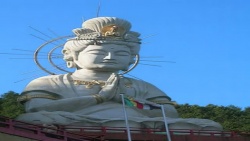Karuṇā
Karuṇā (in both Sanskrit and Pali) is generally translated as compassion. It is part of the spiritual path of both Buddhism and Jainism.
Buddhism
Karuṇā is important in all schools of Buddhism. For Theravāda Buddhists, dwelling in karuṇā is a means for attaining a happy present life and heavenly rebirth. For Mahāyāna Buddhists, karuṇā is a co-requisite for becoming a Bodhisattva. karuna; 悲・慈悲 (Skt, Pali; Jpn hi or jihi )
See; compassion.
- Compassion is that which makes the heart of the good move at the pain of others. It crushes and destroys the pain of others; thus, it is called compassion. It is called compassion because it shelters and embraces the distressed.
- - The Buddha.
Theravada Buddhism
In Theravāda Buddhism, karuṇā is one of the four "divine abodes" (brahmavihāra), along with loving kindness (Pāli: mettā), sympathetic joy (mudita) and equanimity (upekkha). In the Pali canon, the Buddha recommends cultivating these four virtuous mental states to both householders and monastics. When one develops these four states, the Buddha counsels radiating them in all directions, as in the following stock canonical phrase regarding karuṇā:
- He keeps pervading the first direction—as well as the second direction, the third, and the fourth—with an awareness imbued with compassion. Thus he keeps pervading above, below, & all around, everywhere & in every respect the all-encompassing cosmos with an awareness imbued with compassion: abundant, expansive, immeasurable, free from hostility, free from ill will.
Such a practice purifies one's mind, avoids evil-induced consequences, leads to happiness in one's present life and, if there is a future karmic rebirth, rebirth in a heavenly realm.
The Pali commentaries distinguish between karuṇā and mettā in the following complementary manner: Karuna is the desire to remove harm and suffering (ahita-dukkha-apanaya-kāmatā) from others; while mettā is the desire to bring about the well-being and happiness (hita-sukha-upanaya-kāmatā) of others.
Mahayana Buddhism
In Mahāyāna Buddhism, karuṇā is one of the two qualities, along with enlightened wisdom (Sanskrit: prajña), to be cultivated on the bodhisattva path. According to scholar Rupert Gethin, this elevation of karuṇā to the status of prajña is one of the distinguishing factors between the Theravāda arahant ideal and the Mahāyāna bodhisattva ideal:
- For the Mahāyāna ... the path to arhatship appears tainted with a residual selfishess since it lacks the motivation of the great compassion (mahākaruṇā) of the bodhisattva, and ultimately the only legitimate way of Buddhist practice is the bodhisattva path.
Throughout the Mahāyāna world, Avalokiteśvara (Sanskrit; Chinese: Guan Yin; Japanese: Kanzeon; Tibetan: Chenrezig) is a bodhisattva who embodies karuṇā.
In the Intermediate section of the Stages of Meditation by Kamalashila, he writes:
- Moved by compassion(karunā), Bodhisattvas take the vow to liberate all sentient beings. Then by overcoming their self-centered outlook, they engage eagerly and continuously in the very difficult practices of accumulating merit and insight. Having entered into this practice, they will certainly complete the collection of merit and insight. Accomplishing the accumulation of merit and insight is like having omniscience itself in the palm of your hand. Therefore, since compassion is the only root of omniscience, you should become familiar with this practice from the very beginning."
In Indo-Tibetan Buddhism, one of the foremost authoritative texts on the Bodhisattva path is the Bodhicaryavatara by Shantideva. In the eighth section entitled Meditative Concentration, Shantideva describes meditation on Karunā as thus:
- Strive at first to meditate upon the sameness of yourself and others. In joy and sorrow all are equal; Thus be guardian of all, as of yourself. The hand and other limbs are many and distinct, But all are one--the body to kept and guarded. Likewise, different beings, in their joys and sorrows, are, like me, all one in wanting happiness. This pain of mine does not afflict or cause discomfort to another's body, and yet this pain is hard for me to bear because I cling and take it for my own. And other beings' pain I do not feel, and yet, because I take them for myself, their suffering is mine and therefore hard to bear. And therefore I'll dispel the pain of others, for it is simply pain, just like my own. And others I will aid and benefit, for they are living beings, like my body. Since I and other beings both, in wanting happiness, are equal and alike, what difference is there to distinguish us, that I should strive to have my bliss alone?"
Karuna (Pali: compassion) is the ability to feel the distress or pain of others as if it were one’s own. The English word compassion has exactly the same meaning and comes from the Latin com meaning ‘with’ and passio meaning ‘suffering.’ Sometimes in Buddhist psychology compassion is also called commiseration (dayà), empathy (anuddàyanà) or sympathy (anukampà).
The most noticeable feature of the Buddha’s personality was his compassion and this compassion was not just something he felt for others or that they felt in his presence, it was also the motive for much of what he said and did. He said, ‘What should be done out of compassion for his disciples by a teacher who cares about their welfare and out of compassion for them, I have done for you’ (M.I,46).
The Buddha visited and comforted the sick ‘out of compassion’ (Anguttara Nikaya 3. 378), he taught the Dhamma ‘out of compassion’ (Anguttara Nikaya 3. 167). Once he went into the forest looking for a serial killer because he had compassion for his potential victims and also for the murderer himself (Majjhima Nikaya 2. 980). The Buddha’s compassion seems to have transcended even the bounds of time. He is described sometimes as doing or refraining from doing certain things ‘out of compassion for coming generations’ (Majjhima Nikaya 1. 23). Once he said that his very reason for being was ‘for the good of the many, for the happiness of the many, out of compassion for the world, for the welfare, the benefit and the happiness of gods and humans’ (Anguttara Nikaya 2. 146).
Compassion is the second of the four Brahma Viharas and was more highly praised by the Buddha than any other virtues because it is the root of so many other virtues. The Jàtakamàlà says, ‘Compassion gives birth to all the other virtues just as cooling rain makes the crops grow. When a person is compassionate he has no desire to harm his neighbour, his body, speech and mind are purified, concern for one’s neighbour’s welfare increases and states like kindness, patience, happiness and good reputation grow. Being calm, the compassionate person does not arouse fear in the minds’ of others, he is trusted like a kinsman, he is not agitated by the passions, and quenched by the waters of compassion, the fire of hatred does not blaze in his heart…Remembering this strive to develop compassion towards others, as if they were yourself or your offspring.’
Jainism
Karuṇā is associated with the Jain practice of compassion. For instance, karuṇā is one of the four reflections of universal friendship — along with amity (Sanskrit: maitri), appreciation (pramoda) and equanimity (madhyastha)—used to stop (samvara) the influx of karma.
Miscellaneous
Karuṇā is a common surname in sanskrit, hindi and Tamil. It is used both for girls and boys.
References
- http://www.BuddhismAtoZ.com/
- The Complete Book of Buddha's Lists -- Explained. David N. Snyder, Ph.D., 2006.
- http://www.thedhamma.com/
- http://www.brahmaviharas.com/


